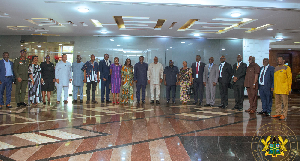 This move comes alongside Mahama’s 24-Hour Economy plan aimed at boosting economic growth
This move comes alongside Mahama’s 24-Hour Economy plan aimed at boosting economic growth
President John Dramani Mahama has inaugurated the Accelerated Export Development Advisory Committee (AEDAC) as part of efforts to transform Ghana into an export-led economy.
The 19-member committee, chaired by the President, marks the fulfillment of his 2024 campaign promise to personally work with industry leaders to remove the bottlenecks and disincentives hindering the rapid expansion of Ghana’s export sector.
This initiative is intended to make Made-in-Ghana goods more available and appreciated across the African continent and in the international marketplace.
The move coincides with his 24-Hour Economy plan, aimed at boosting economic growth and creating job opportunities across the country.
President Mahama stated that under the AEDAC and the National Export Development Strategy, the goal is to increase Ghana’s non-traditional export earnings from $3.5 billion annually to at least $10 billion by 2030.
He noted that achieving this target would require prioritizing value addition and economic diversification.
He emphasized that Ghana’s current exports remain dominated by low-complexity raw materials, such as gold, cocoa, cashew, and timber, all largely exported in their raw state.
The President said the inauguration of the AEDAC represents a critical step in the country’s collective resolve to transform its economy through competitive exports, inclusive industrialization, and purposeful integration into regional and global markets.
He acknowledged that despite its significant potential, Ghana’s export sector is hampered by entrenched bottlenecks.
“Nearly 47 percent of Ghanaian exporters report facing serious trade obstacles, with non-tariff measures and procedural delays accounting for most of these challenges,” he stated.
He added: “Over 52 percent of the complaints relate to costly and time-consuming technical regulations, with multiple poorly coordinated agencies imposing requirements. An exporter may need up to 16 different documents just to obtain a certificate of origin.”
He noted that the Ghana Standards Authority, tasked with safeguarding product quality, is often under-resourced. At the same time, the absence of accredited local laboratories forces exporters to rely on foreign testing facilities, increasing costs and causing unnecessary delays.
He further explained that at the nation’s ports, overlapping inspections, prolonged clearance times, and informal fees create additional burdens for exporters.
According to the International Trade Centre, these inefficiencies cost Ghana up to $4.3 billion in lost export revenue each year.
In the fisheries sector, he said, repeated alerts from the European Union about illegal fishing, hydrocarbon, and heavy metal contamination have led to temporary bans on fish exports, resulting in significant reputational damage.
President Mahama also highlighted that Ghana ranks 110 out of 133 countries on the Global Economic Complexity Index.
“This must change. We will support our private sector partners to invest in agri-processing and light manufacturing,” he said.
He added that AEDAC would collaborate closely with the private sector, development partners, academia, and regional institutions to dismantle barriers, identify new export opportunities, and drive coordinated reform.
Goosie Tanoh, Presidential Advisor for the 24-Hour Economy, stated that the AEDAC programme envisions a resilient, self-reliant, and globally competitive economy that optimizes asset utilization and creates value for all citizens, especially the most vulnerable.
He said the programme is built around three fundamental pillars: production transformation, market systems efficiency, and human capital development.
